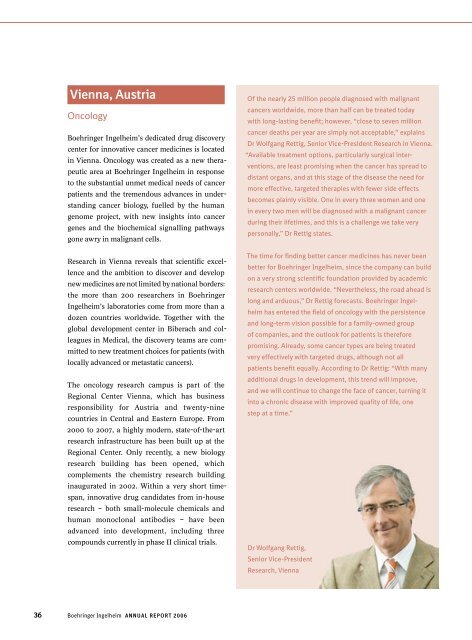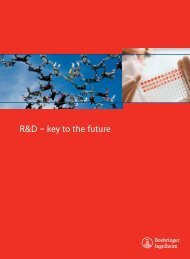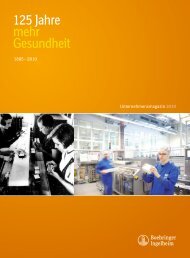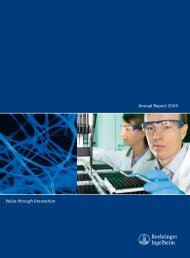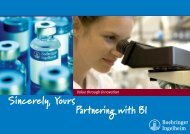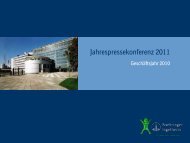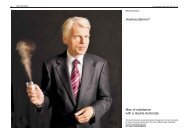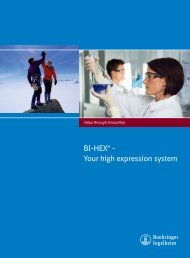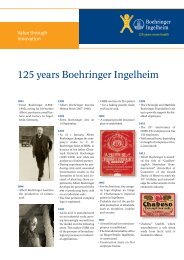Annual Report 2006 - Boehringer Ingelheim
Annual Report 2006 - Boehringer Ingelheim
Annual Report 2006 - Boehringer Ingelheim
You also want an ePaper? Increase the reach of your titles
YUMPU automatically turns print PDFs into web optimized ePapers that Google loves.
Vienna, Austria<br />
Oncology<br />
<strong>Boehringer</strong> <strong>Ingelheim</strong>’s dedicated drug discovery<br />
center for innovative cancer medicines is located<br />
in Vienna. Oncology was created as a new thera-<br />
peutic area at <strong>Boehringer</strong> <strong>Ingelheim</strong> in response<br />
to the substantial unmet medical needs of cancer<br />
patients and the tremendous advances in under-<br />
standing cancer biology, fuelled by the human<br />
genome project, with new insights into cancer<br />
genes and the biochemical signalling pathways<br />
gone awry in malignant cells.<br />
Research in Vienna reveals that scientific excellence<br />
and the ambition to discover and develop<br />
new medicines are not limited by national borders:<br />
the more than 200 researchers in <strong>Boehringer</strong><br />
<strong>Ingelheim</strong>’s laboratories come from more than a<br />
dozen countries worldwide. Together with the<br />
global development center in Biberach and colleagues<br />
in Medical, the discovery teams are committed<br />
to new treatment choices for patients (with<br />
locally advanced or metastatic cancers).<br />
The oncology research campus is part of the<br />
Regional Center Vienna, which has business<br />
responsibility for Austria and twenty-nine<br />
countries in Central and Eastern Europe. From<br />
2000 to 2007, a highly modern, state-of-the-art<br />
research infrastructure has been built up at the<br />
Regional Center. Only recently, a new biology<br />
research building has been opened, which<br />
complements the chemistry research building<br />
inaugurated in 2002. Within a very short time-<br />
span, innovative drug candidates from in-house<br />
research – both small-molecule chemicals and<br />
human monoclonal antibodies – have been<br />
advanced into development, including three<br />
compounds currently in phase II clinical trials.<br />
<strong>Boehringer</strong> <strong>Ingelheim</strong> A n n u A l R e p o R t 2 0 0 6<br />
Of the nearly 25 million people diagnosed with malignant<br />
cancers worldwide, more than half can be treated today<br />
with long-lasting benefit; however, “close to seven million<br />
cancer deaths per year are simply not acceptable,” explains<br />
Dr Wolfgang Rettig, Senior Vice-President Research in Vienna.<br />
“Available treatment options, particularly surgical inter-<br />
ventions, are least promising when the cancer has spread to<br />
distant organs, and at this stage of the disease the need for<br />
more effective, targeted therapies with fewer side effects<br />
becomes plainly visible. One in every three women and one<br />
in every two men will be diagnosed with a malignant cancer<br />
during their lifetimes, and this is a challenge we take very<br />
personally,” Dr Rettig states.<br />
The time for finding better cancer medicines has never been<br />
better for <strong>Boehringer</strong> <strong>Ingelheim</strong>, since the company can build<br />
on a very strong scientific foundation provided by academic<br />
research centers worldwide. “Nevertheless, the road ahead is<br />
long and arduous,” Dr Rettig forecasts. <strong>Boehringer</strong> <strong>Ingelheim</strong><br />
has entered the field of oncology with the persistence<br />
and long-term vision possible for a family-owned group<br />
of companies, and the outlook for patients is therefore<br />
promising. Already, some cancer types are being treated<br />
very effectively with targeted drugs, although not all<br />
patients benefit equally. According to Dr Rettig: “With many<br />
additional drugs in development, this trend will improve,<br />
and we will continue to change the face of cancer, turning it<br />
into a chronic disease with improved quality of life, one<br />
step at a time.”<br />
Dr Wolfgang Rettig,<br />
Senior Vice-President<br />
Research, Vienna


